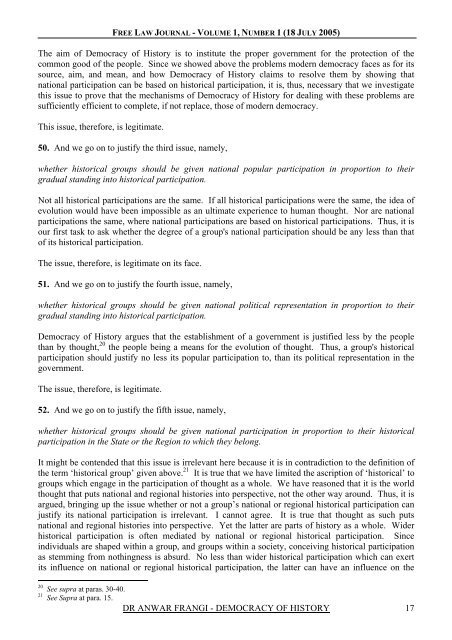Free_Law_Journal-Vol.. - Free World Publishing Inc.
Free_Law_Journal-Vol.. - Free World Publishing Inc.
Free_Law_Journal-Vol.. - Free World Publishing Inc.
Create successful ePaper yourself
Turn your PDF publications into a flip-book with our unique Google optimized e-Paper software.
FREE LAW JOURNAL - VOLUME 1, NUMBER 1 (18 JULY 2005)<br />
The aim of Democracy of History is to institute the proper government for the protection of the<br />
common good of the people. Since we showed above the problems modern democracy faces as for its<br />
source, aim, and mean, and how Democracy of History claims to resolve them by showing that<br />
national participation can be based on historical participation, it is, thus, necessary that we investigate<br />
this issue to prove that the mechanisms of Democracy of History for dealing with these problems are<br />
sufficiently efficient to complete, if not replace, those of modern democracy.<br />
This issue, therefore, is legitimate.<br />
50. And we go on to justify the third issue, namely,<br />
whether historical groups should be given national popular participation in proportion to their<br />
gradual standing into historical participation.<br />
Not all historical participations are the same. If all historical participations were the same, the idea of<br />
evolution would have been impossible as an ultimate experience to human thought. Nor are national<br />
participations the same, where national participations are based on historical participations. Thus, it is<br />
our first task to ask whether the degree of a group's national participation should be any less than that<br />
of its historical participation.<br />
The issue, therefore, is legitimate on its face.<br />
51. And we go on to justify the fourth issue, namely,<br />
whether historical groups should be given national political representation in proportion to their<br />
gradual standing into historical participation.<br />
Democracy of History argues that the establishment of a government is justified less by the people<br />
than by thought, 20 the people being a means for the evolution of thought. Thus, a group's historical<br />
participation should justify no less its popular participation to, than its political representation in the<br />
government.<br />
The issue, therefore, is legitimate.<br />
52. And we go on to justify the fifth issue, namely,<br />
whether historical groups should be given national participation in proportion to their historical<br />
participation in the State or the Region to which they belong.<br />
It might be contended that this issue is irrelevant here because it is in contradiction to the definition of<br />
the term ‘historical group’ given above. 21 It is true that we have limited the ascription of ‘historical’ to<br />
groups which engage in the participation of thought as a whole. We have reasoned that it is the world<br />
thought that puts national and regional histories into perspective, not the other way around. Thus, it is<br />
argued, bringing up the issue whether or not a group’s national or regional historical participation can<br />
justify its national participation is irrelevant. I cannot agree. It is true that thought as such puts<br />
national and regional histories into perspective. Yet the latter are parts of history as a whole. Wider<br />
historical participation is often mediated by national or regional historical participation. Since<br />
individuals are shaped within a group, and groups within a society, conceiving historical participation<br />
as stemming from nothingness is absurd. No less than wider historical participation which can exert<br />
its influence on national or regional historical participation, the latter can have an influence on the<br />
20 See supra at paras. 30-40.<br />
21 See Supra at para. 15.<br />
DR ANWAR FRANGI - DEMOCRACY OF HISTORY 17
















